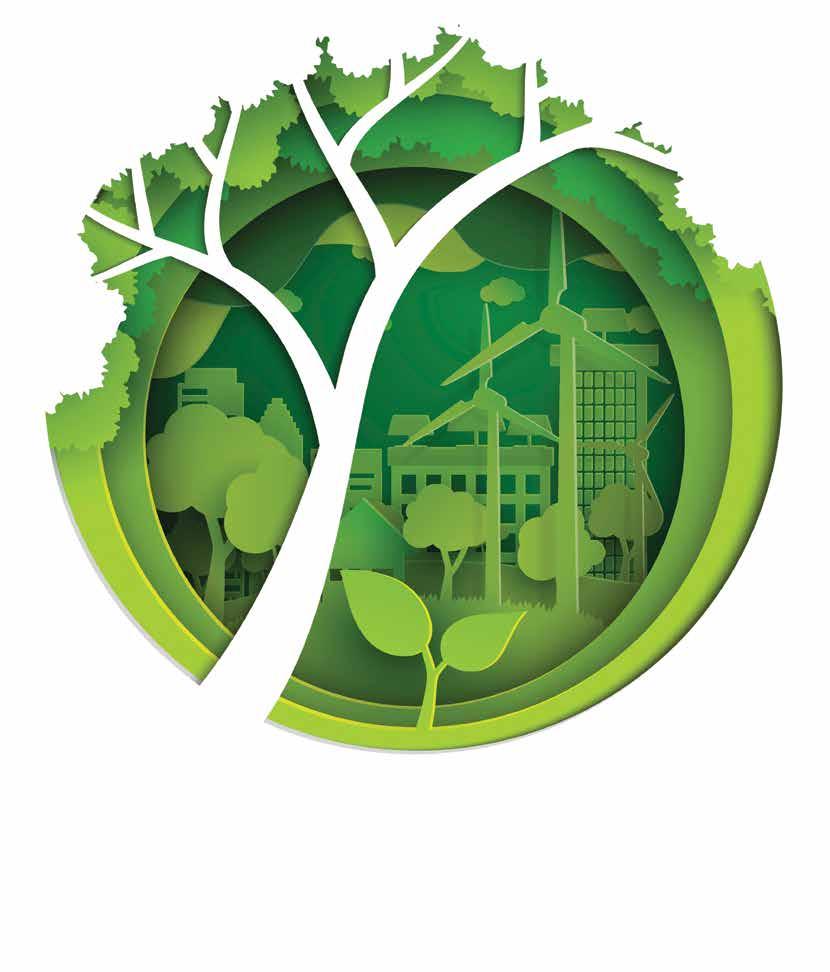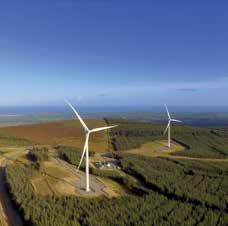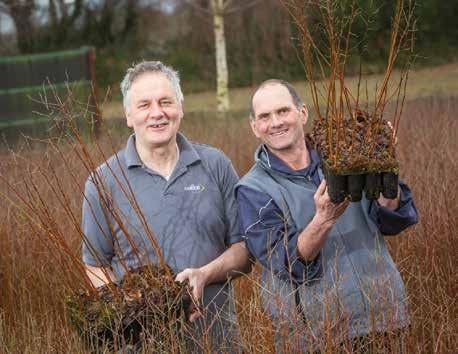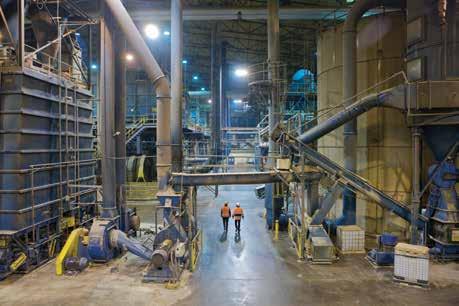
7 minute read
THE BURDEN OF PROOF
Room for Growth
AS THE COMPANY APPROACHES 30 YEARS IN BUSINESS, COILLTE CHIEF EXECUTIVE FERGAL LEAMY DISCUSSES THE EVOLUTION OF THE BUSINESS AND THE POTENTIAL FOR IRISH FORESTRY.
According to Coillte, the value of Irish forestry is set to double to around €5 billion over the next 10 years. Coillte Chief Executive Fergal Leamy, now three-and-a-half years in the job, describes Ireland’s forestry sector as a ‘hidden gem’, undervalued, underestimated and with a value to the Irish economy that is currently unrealised. While much more can be done in terms of improving and expanding the country’s forest cover, the Department of Agriculture’s Forest Statistics – Ireland 2017 report notes that the level is estimated to be at its highest for more than 350 years, with farmers accounting for 83 per cent of afforestation on private land between 1980 and 2016. The potential for growth is significant.
“It’s an extraordinary sector that employs 12,000 people up and down the country, mostly in rural areas,” says Leamy. “It’s a sector that has huge growth potential and that’s not just us wishing it, it’s because the trees are in the ground and, due to the significant planting over the last 20 years, the forest sector will double in size over the next ten years. It’s a sector that is worth €2.2bn to the Irish economy today and it’s a sector that has a genuine competitive advantage.”
Next year the organisation celebrates its 30th anniversary, having been established in 1989 as a semi-state structure separate to the Department of Agriculture and Forestry. Those three decades have witnessed momentous change in its remit and outlook, moving from simply providing logs to activities spread across three core business strands.
“In 1989 it was a business that had 3,000 employees, £30 million of turnover and really it had a single focus which was selling logs to the sawmills in Ireland. Now, if you roll forward to today, we’re a business that has €350m in turnover, we have 800 employees and we operate in three different business areas,” Leamy explains. Forestry remains a core activity, with timber manufacturing in the form of MDF and OSB at Coillte’s plants in Waterford and Clonmel. The Land Solutions aspect of the business has also been successful, with a primary focus on renewable energy and wind farm development over the last few years.
“It’s quite a dramatically different organisation today than it would have been when it was envisioned in 1989 and, over the last three years in particular, we have really begun to generate a significant return for the shareholder, which is the State,” he adds. “We’ve gone from an organisation that would have generated close to zero per cent return on the €1.5bn of assets to an organisation that, this year, will make a four per cent return on that, towards a five per cent return in the next two years. [We are] really trying to generate a solid commercial return from the assets that we have.”


Fergal Leamy
DEVELOPMENT PLAN
This year, the company’s focus is two-fold. Firstly, Coillte is continuing to embed the transformation it has undertaken over the last three years, as it’s currently in the middle of a five-year restructuring process aimed at reducing its reliance on largescale land transactions and shifting its focus to its three core business activities in forestry, wood panel manufacturing through Medite Smartply and wind
A Coillte wind farm.
Eamon Bardon and Pat Peters from Coillte Nurseries, Aughrim.

SMARTPLY production.

energy (Land Solutions). So far so good – the company recently reported a record year of growth in 2017, doubling its operating cash from €15m to 20m and achieving record revenue of €298.7m.
“We’ve invested quite a lot in our business over the last two years. Last year we put €60 million into Smartply to enable it to create value-added product. The whole concept here it to take a piece of wood from our forests and add the maximum value to it,” says Leamy. “Our job is to make sure we get the most value for that. So, instead of getting €10 or €15 per board we work on getting maybe €50 to €100 per board and we do that by doing the difficult things that our competitors won’t do. So in Waterford and Clonmel we [produce] things like fire retardant [panels], we do moisture resistant boards for skirting and architrave.” Last year, Coillte entered a partnership with energy giant BP and UK-based chemical company Accsys Technologies to open a factory in Hull that will produce the world’s first outdoor MDF product with a 50-year guarantee, which the company says will bolster the long-term future of its Medite plant in Clonmel. “An outdoor MDF which is
RURAL BOOST
hugely innovative and really allows us to focus on the top-end value-add segment,” Leamy notes of that process.
Change is also underway on the third prong of Coillte’s business activities – Land Solutions. Under that banner the company has developed four wind farms that Leamy explains will provide electricity to around 200,000 homes. “We are in the process of actually looking at the potential sale of those so we can reinvest that in the further development of maybe 25 sites,” he says. “Land Solutions is about maximising the development of each hectare of land that is non-forestry. And it’s about trying to ensure that we drive that value, but ultimately we don’t want to be a utility player and so it’s about jumping off at the right point in the development cycle.”
Given the potential within the sector, Coillte is examining key global trends around demographics, climate change, technology and world markets as it seeks to define what it will be and do in the next ten years. Understanding the role it will play in the supply chain will be vital in informing its business plan in the coming years. But there are challenges in the road ahead. The State-owned
Given that Irish afforestation levels are well below our European counterparts, there’s a real opportunity to enhance the sector and provide a significant boost to rural employment.
“There’s a real opportunity for us to embrace that as a country, to have something that is sustainable in terms of the long-term economic and social benefits and, from a jobs perspective, [there are] very few industries that would be growing their jobs in such a significant way in rural locations over the next ten years,” Fergal Leamy explains. company faced criticism at the beginning of the year as a number of Irish farmers revealed they had been left without payments from the farm-forestry partnerships, though it asserted that “it is satisfied that there are no cases where farmers have not been paid what they are due and it is satisfied that it is fulfilling all of its contractual obligations.” And, speaking to The Irish Times in May, Leamy noted that the Irish State isn’t embracing the full potential of forestry with afforestation levels below the European average – 11 per cent versus 33 per cent – while the long-term benefits of forestry are perhaps not as widely recognised as they are in other countries like Canada.
Brexit, too, has its part to play. Leamy recently raised the issue at the Timber Industry Brexit Forum in Dublin, explaining to EU Commissioner Phil Hogan and other delegates that the UK is Ireland’s only realistic market for trees. While Medite Smartply exports to 32 countries, the UK represents around 70 per cent of its business for several reasons. Firstly, it’s a heavy product and for sheer economic reasons it makes less sense financially the further it has to travel. Secondly, standards in the UK are similar to those in Ireland, meaning that Coillte’s product is more easily accessible. “The UK – Brexit or no Brexit – is the second largest importer of timber in the world. It’s right on our doorstep so we need to find a way of making that work,” Leamy says.
Still, the outlook for the industry remains optimistic in the years ahead, fueled by the strong demand for timber that exists across the globe.
“I’d be very positive,” Leamy says. “And the reason I’d be very positive is that, globally, the demand for timber is significant and looks like it’s going to continue to outstrip available local supply. I think Ireland is very well-positioned to supply some of that timber because it has a fast-growing commercial crop and that can reach levels that other countries have in terms of levels of afforestation. I think as a country we need to embrace the forestry sector more and that’s going to be a real development over the next few years, as people realise how important it is. If I go to Canada, which I do when we work with people over there, the forestry sector is seen as probably the most important sector in the country. I’m not saying that’s quite where we’ll be in Ireland but certainly there’ll be an evolution from where we are today to somewhere closer to that in the next ten to fifteen years.”










